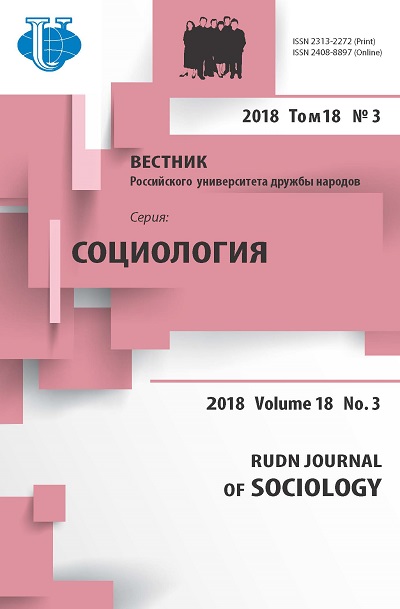SOCIOLOGICAL ANALYSIS OF INTERACTION OF JURISTS AND FORENSIC EXPERTS: THEORETICAL-METHODOLOGICAL APPROACHES
- Authors: Maslovskaya EV1
-
Affiliations:
- Sociological Institute Federal Center of Theoretical and Applied Sociology of the Russian Academy of Sciences
- Issue: Vol 18, No 3 (2018)
- Pages: 404-417
- Section: Theory, Methodology and History of Sociological Research
- URL: https://journals.rudn.ru/sociology/article/view/19178
- DOI: https://doi.org/10.22363/2313-2272-2018-18-3-404-417
- ID: 19178
Cite item
Full Text
Abstract
The article considers the current discussion on the possibilities and limitations of different theoretical-methodological approaches to the study of the representation of expert knowledge in court proceedings, and on the peculiarities of interaction of forensic experts and jurists. The author emphasizes contribution and methodological limitations of the interpretative traditions and focuses on the potential of the actor-network theory for the study of interaction of forensic experts and jurists, such as implementation of Bruno Latour’s principle of “generalized symmetry” and the concept “juridical chain” for the analysis of the legal sphere. The author believes that Latour’s exclusive attention to the “specific rationality” of judicial practice prevented him from revealing complex trajectories of networks both within and outside the particular legal institution that he studied. The article claims that representatives of science and technology studies contribute to de-legitimization of the results of scientific research represented in forensic expert reports for this approach ignores the asymmetry of power relations between experts and jurists. Pierre Bourdieu’s theory of the juridical field allows to overcome the one-sidedness of the actor-network theory for it considers the inner logic of the juridical field development, reveals the asymmetry of power relations within it, competition between bearers of different forms of juridical capital with specific interests and resources, and the influence of other fields on the juridical field. The author believes that the most promising perspective is the combination of actor-network theory, its interpretations in science and technology studies and Bourdieu’s theory of the juridical field, which would allow to analyze not only the inner logic of circulation of expert knowledge but also the external context of its production and transformations within the juridical field.
About the authors
E V Maslovskaya
Sociological Institute Federal Center of Theoretical and Applied Sociology of the Russian Academy of Sciences
Author for correspondence.
Email: ev_maslovskaya@mail.ru
-
7 Krasnoarmeiskaya St., 24/15, Saint Petersburg, 190005, RussiaReferences
- Bourdieu P. Sotsialnoe prostranstvo: polya i praktiki [Social Space: Fields and Practices]. Saint Petersburg: Aleteya; 2005 (In Russ.).
- Joas H., Knoebl W. Sotsialnaya teoriya. Dvadtsat vvodnykh lektsii [Social Theory. Twenty Introductory Lectures]. Saint Petersburg: Aleteya; 2013 (In Russ.).
- Latour B. Novogo vremeni ne bylo. Esse po simmetrichnoi antropologii [We Have Never Been Modern. An Essay on Symmetrical Anthropology]. Saint Petersburg: EUSPb; 2006 (In Russ.).
- Latour B. Nauka v deistvii: sleduya za uchenymi i ingenerami vnutri obschestva [Science in Action: Following Scientists and Engineers inside Society]. Saint Petersburg: EUSPb; 2015 (In Russ.).
- Maslovskaya E. Natsiolnalnye shkoly sovremennoi sotsiologii prava [National schools of contemporary sociology of law]. Zhurnal Sotsiologii i Sotsialnoi Antropologii. 2007; 3: 52—64 (In Russ.).
- Maslovskaya E., Maslovskiy M. Kontseptsiya yuridicheskogo polya i sovremennaya sotsiologiya prava [The concept of juridical field and contemporary sociology of law]. Sotsiologiya Vlasti. 2015; 2: 48—65 (In Russ.).
- Maslovskaya E. Osobennosti vzaimodeistviya ekspertov so sledstvennymi i sudebnymi organami (na primere sudebno-meditsinskih ekspertov i ekspertov v oblasti otsenochnoi deyatelnosti) [The peculiarities of interaction of experts with investigative and judicial bodies (on the example of forensic experts and assessors)]. Rossiiskii Zhurnal Pravovykh Issledovanii. 2016; 4: 148—153 (In Russ.).
- Obydennoe i nauchnoe znanie ob obschestve: vzaimovliyaniya i reconfiguratsii [Ordinary and scientific social knowledge: Interconnections and reconfigurations]. Ed. by I. Deviatko, R. Abramov, I. Katerny. Moscow: Progress-Tradition; 2015 (In Russ.).
- Kharkhordin O. Predislovie redaktora [Editor’s introduction]. Latour B. Novogo vremeni ne bylo. Esse po simmetrichnoi antropologii. Saint Petersburg: EUSPb; 2006. Pp. 5—56 (In Russ.).
- Audren F., De Bellaing C. Bruno Latour’s legal anthropology. Law and Social Theory. Ed. by R. Banakar, M. Travers. Oxford: Hart Publishing; 2013. Pp. 181—194.
- Cotterrell R. The Sociology of Law: An Introduction. London: Butterworths; 1992.
- Cotterrell R. Ant’s eye-view of law. Journal of Classical Sociology. 2011; 11: 506—510.
- Deflem M. Sociology of Law: Visions of a Scholarly Tradition. Cambridge: Cambridge University Press; 2008.
- Dezalay Y., Madsen M. The force of law and lawyers: Pierre Bourdieu and reflexive sociology of law. The Annual Review of Law and Social Science. 2012; 8: 433—452.
- Edmond H. Judicial representations of scientific evidence. Modern Law Review. 2000; 63: 216—251.
- Eisenstein J., Jacob H. Felony Justice: An Organizational Analysis of Criminal Court. Boston: Little, Brown and Co.; 1977.
- Francis A. At the Edge of Law: Emergent and Divergent Models of Legal Professionalism. Furnham: Ashgate; 2011.
- Krieken R. Law’s autonomy in action: Anthropology and history in court. Social and Legal Studies. 2006; 15: 574—590.
- Kruse C. The Social Life of Forensic Evidence. Berkeley: University of California Press; 2016.
- Latour B. The Making of Law: An Ethnography of the Conceil d’État. Cambridge: Polity; 2010.
- Nance D. Reliability and the admissibility of experts. Seton Hall Law Review. 2003; 34: 191—254.
- Saks M., Faigman D. Expert evidence after Daubert. Annual Review of Law and Social Science. 2005; 1: 105—130.
- Sommerlad H. Researching and theorizing the processes of professional identity formation. Journal of Law and Society. 2007; 34: 190—217.
- Travers M. Interpretive sociologists and law. Law and Social Theory. Ed. by R. Banakar, M. Travers. Oxford: Hart Publishing; 2013. Pp. 165—180.
Supplementary files













